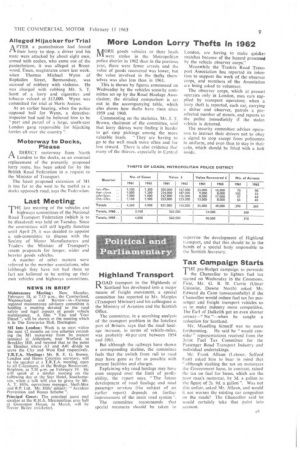More London Lorry Thefts in 1962
Page 11

If you've noticed an error in this article please click here to report it so we can fix it.
ikiTORE goods vehicles or their loads Iv' were stolen in the Metropolitan police district in 1962 than in the previous year, there were fewer arrests and the value of goods recovered was lower, hut the value involved in the thefts themselves was also Jess than in 1961.
This is shown by figures announced on Wednesday by the vehicles security cornmittee set up by the Road Haulage Association; the detailed comparison is set out in the accompanying table, which also shows how thefts have risen since 1959 and 1960.
Commenting on the statistics, Mr. J. Brown, chairman of the committee, said that lorry thieves were finding it harder to get easy pickings among the more valuable loads. They are having to go to the well much more often and for less reward. There is also evidence that many of the thieves, especially in Central London, are having to make quicker snatches because of the hazard presented by the vehicle observer corps."
Meanwhile the Traders Road Transport Association has reported its intention to support the work of the observer corps, and members of the Association are being asked to volunteer.
The observer corps, which at present operates only in London, uses cars supplied by transport operators; when a lorry theft is reported, each car, carrying a driver and observer, patrols a preselected number of streets, and reports to the police immediately if the stolen vehicle is detected.
The security committee advises operators to instruct their drivers not to obey a signal to stop except from policemen in uniform, and even then to stay in their cabs, which should be fitted with a bolt inside.












































































































